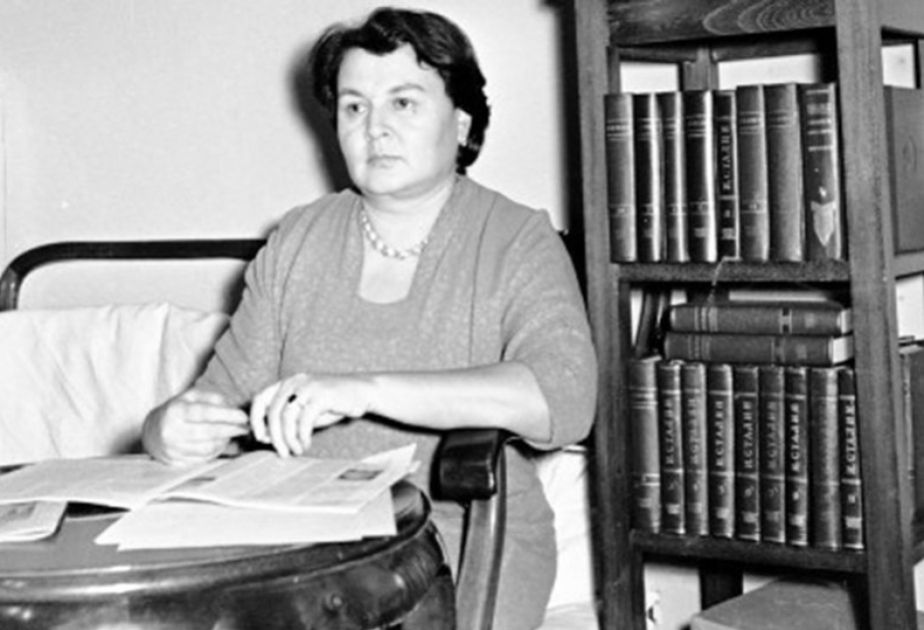Poetess who leaves everlasting imprint on national literature

This year marks the 44th anniversary of the passing of Nigar Rafibayli, a poetess whose delicate soul and refined nature left an everlasting imprint on 20th-century Azerbaijani poetry, Azernews reports.
A key figure in the country's literary history, Rafibayli's works are a profound reflection of her era, shaped by turbulent political movements and societal transformation. Her unique voice, one that blended intellectual rigour with emotional depth, continues to resonate in the hearts of Azerbaijani readers.
Poetess Born from Revolution and Change
Born on June 23, 1913, in Ganja, Azerbaijan, Nigar Rafibayli's early life was marked by a profound connection to the changing tides of her homeland. Growing up in an era where Azerbaijan was transitioning from a traditional society to a modern state, Rafibayli was deeply influenced by the revolutionary movements sweeping across the globe.
After completing her studies at the Baku Pedagogical Technical School in 1930, Rafibayli pursued higher education at the Moscow Pedagogical Institute from 1932 to 1936, where she honed her intellectual and literary skills. Back in Baku, she began her career at the Baku Film Studio, working as a translator and editor in the screenplay department. In the late 1930s, she transitioned to literary work, contributing to the publication "Ushaggəncnəşr" as an editor in the artistic literature department.
Literary Debut at Young Age
Rafibayli’s literary career began early. At just 15 years old, her poem "Çadra" was published in the journal "Dan Ulduzu" in 1928, marking the beginning of her impressive journey in Azerbaijani literature. Her poetic style, characterised by its lyrical beauty and intellectual depth, was quickly embraced by the literary community, and in 1934, she published her first poetry collection.
The poems in this collection highlight the new role of Azerbaijani women in shaping the country's future. This theme would continue to emerge throughout her career as she explored the intersection of gender, politics, and social change. Her work remains a testament to the courage and resilience of Azerbaijani women, as well as a celebration of their contributions to society's transformation.
Voice for Global Struggles
Though deeply rooted in her own culture, Rafibayli's worldview was global. She was not just a poetess of Azerbaijan; she was a poet of the world. In the 1930s, as political movements for justice and liberation surged across Europe and beyond, Rafibayli responded with poems that engaged with international struggles.
One of her notable works, Dolores Ibaruri (1936), was dedicated to the Spanish people's fight against fascism. Similarly, her poem "Cəmilə" reflected her admiration for the Algerian people's national-liberation struggle, intertwining political events with her own passionate ideals of freedom and justice.
These poems highlighted Rafibayli's intellectual engagement with global politics, but also revealed the depth of her humanity. Her works were not mere political statements; they were heartfelt tributes to those who fought for their ideals, their nations, and their people.
Multifaceted Legacy
Beyond her work as a poetess, Nigar Rafibayli was a translator, a critical cultural bridge between Azerbaijani literature and the literary traditions of the world. Over the course of her life, she translated a wide range of works from Russian, French, and other languages into Azerbaijani, making the works of world-renowned authors accessible to local audiences.
Among the authors whose works she translated were Alexander Pushkin, Mikhail Lermontov, and Taras Shevchenko, as well as plays by Anton Chekhov, including "Uncle Vanya" and "The Cherry Orchard". Her translations also included works by Friedrich Schiller, Euripides, and Ali Shir Navai, demonstrating her deep understanding of both Eastern and Western literary traditions.
Her translations not only enriched Azerbaijani literature but also positioned her as a bridge between cultures. Her meticulous work brought global voices to the Azerbaijani reader, further cementing her place as one of the foremost literary figures of her time.
Children's Literature and Musical Legacy
Nigar Rafibayli's literary contributions were not limited to adults. She wrote extensively for children, creating books that have remained beloved by generations. Titles like "Balaca qəhrəman" (1942), "Günəşin cavabı" (1966), and "Məstanın balaları" (1968) are a testament to her ability to speak to young hearts with the same elegance and emotional depth as she did to adult readers. Her poems for children celebrate innocence, heroism, and the wonders of nature, blending storytelling with an important moral compass.
Moreover, Rafibayli's poetry found its way into the realm of music. One of her most cherished works, "Alagözlüm", dedicated to her husband, the renowned Azerbaijani People's Poet R. Rza, became a beloved song performed by the legendary Akif Islamzadə. Today, the song remains a timeless piece of Azerbaijani musical heritage, beloved by many for its emotional depth and lyrical beauty.
Nigar Rafibayli's legacy is not confined to the written word alone. Her poems captured the essence of Azerbaijan's struggle for independence, its socio-political evolution, and the spirit of its people. Her works on themes of nature, patriotism, peace, and the pursuit of freedom transcend time and place. In her poems, the struggles of the common people were immortalised, as were their dreams for a better future.
Nigar Rafibayli passed away on July 9, 1981, in Baku, leaving behind a legacy that continues to shape Azerbaijani literature.
Here we are to serve you with news right now. It does not cost much, but worth your attention.
Choose to support open, independent, quality journalism and subscribe on a monthly basis.
By subscribing to our online newspaper, you can have full digital access to all news, analysis, and much more.
You can also follow AzerNEWS on Twitter @AzerNewsAz or Facebook @AzerNewsNewspaper
Thank you!

